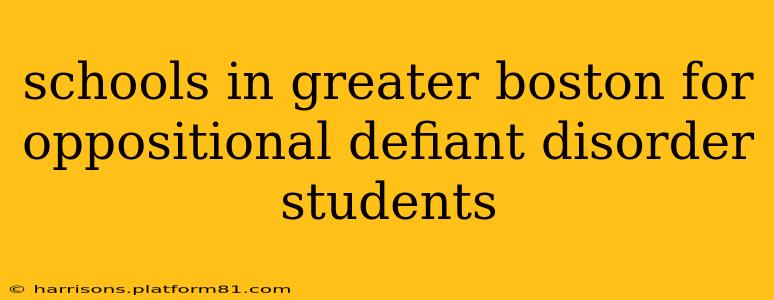Oppositional Defiant Disorder (ODD) presents unique challenges for both students and educators. Finding the right school environment is crucial for a child's success and well-being. Greater Boston offers a range of educational options designed to support students with ODD, catering to varying needs and learning styles. This guide will explore the types of schools and programs available, helping parents and caregivers navigate this important decision.
What Types of Schools in Greater Boston Cater to Students with ODD?
Several school types in the Greater Boston area effectively address the needs of students with ODD. These include:
-
Specialized Schools: These schools are specifically designed to work with students who have behavioral and emotional challenges, including ODD. They often have smaller class sizes, highly trained staff experienced in managing challenging behaviors, and individualized therapeutic support. The curriculum might be adapted to address specific learning needs often associated with ODD, such as impulsivity and difficulty with emotional regulation.
-
Public Schools with Specialized Programs: Many public school districts in Greater Boston offer specialized programs within their existing schools. These programs may incorporate therapeutic interventions and behavioral support strategies within a mainstream school setting. These programs vary significantly in their intensity and approach, so thorough research into individual district offerings is necessary.
-
Residential Treatment Centers: For students with severe ODD or co-occurring disorders requiring a higher level of care, residential treatment centers provide a structured living environment along with intensive therapeutic intervention. These centers often work closely with families to ensure a seamless transition back to a less restrictive setting when appropriate.
-
Therapeutic Day Schools: These schools combine academic instruction with intensive therapy and behavioral support during the school day. Students attend the school daily but return home in the evening. They offer a balance between structure and community support.
What are the Key Features of Effective Schools for Students with ODD?
Choosing the right school involves considering several crucial factors. Effective schools for students with ODD typically feature:
-
Low Student-to-Staff Ratios: Smaller class sizes allow for more individualized attention and support, crucial for students who may require more frequent intervention or redirection.
-
Experienced and Trained Staff: Educators and support staff should possess expertise in managing challenging behaviors, trauma-informed care, and evidence-based interventions for ODD.
-
Individualized Education Programs (IEPs): IEPs are essential for tailoring the academic and therapeutic approaches to meet each student's unique needs. These plans are developed collaboratively with parents, educators, and therapists.
-
Positive Behavioral Interventions and Supports (PBIS): Schools utilizing PBIS implement proactive strategies to prevent challenging behaviors and teach alternative coping mechanisms.
-
Therapeutic Interventions: Access to on-site counseling, therapy, and social skills training is crucial for addressing the underlying emotional and behavioral issues associated with ODD.
-
Strong Communication with Families: Open and consistent communication between the school and family is vital for ensuring a cohesive and supportive environment for the student.
How Can I Find Schools in Greater Boston that Meet My Child's Needs?
Finding the appropriate school requires diligent research and careful consideration of your child's specific needs and the school's capabilities. Here's a suggested process:
-
Contact your child's current school psychologist or therapist: They can provide valuable recommendations and insights based on your child's individual needs and characteristics.
-
Research local school districts: Explore the websites of public school districts in Greater Boston to identify programs specifically designed for students with emotional and behavioral disorders.
-
Reach out to private schools and specialized programs: Contact private schools and therapeutic day schools directly to inquire about their programs, admissions processes, and the specific support services they offer.
-
Schedule school visits: Visiting potential schools allows you to observe the classroom environment, interact with staff, and get a feel for the school's culture.
-
Consult with educational consultants: Educational consultants specialize in helping families find appropriate schools for students with special needs. They can provide guidance and support throughout the process.
What are the Differences Between Public and Private Schools for ODD?
Public and private schools both offer programs for students with ODD, but they differ significantly in funding, accessibility, and the types of programs offered. Public schools are funded by the government and generally more accessible, but programs may be less specialized. Private schools rely on tuition and may offer more individualized attention and specialized programs, but they can be significantly more expensive. The choice between public and private depends largely on individual financial circumstances and the intensity of support required.
Remember, finding the right educational setting for a child with ODD is a crucial step toward their success and well-being. Thorough research, open communication, and a careful consideration of your child's individual needs are essential throughout this process. Don't hesitate to seek support from professionals in guiding your decision-making.
